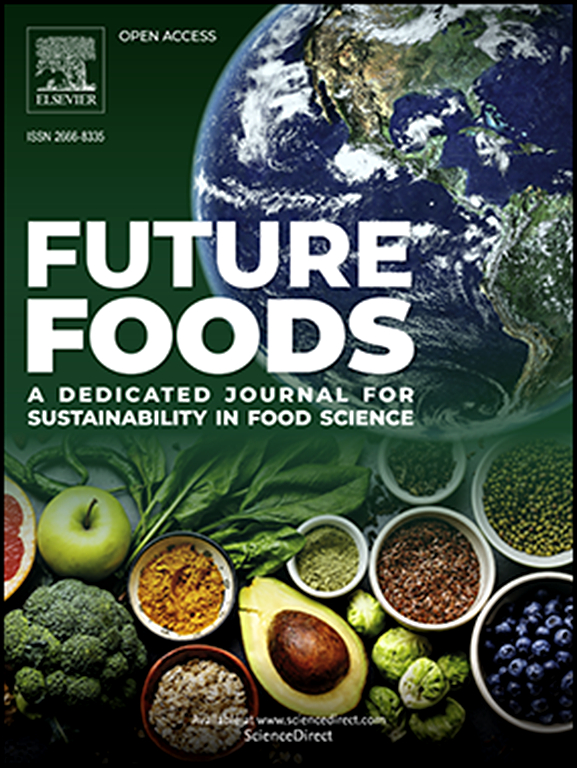冷却辅助冷压:高品质大麻籽油提取的可持续方法
IF 8.2
Q1 FOOD SCIENCE & TECHNOLOGY
引用次数: 0
摘要
大麻籽油(HSO)因其丰富的营养成分和生物活性化合物而受到重视,包括多不饱和脂肪酸、生育酚和植物甾醇。随着对可持续、高品质功能食品需求的增长,优化提取方法对于保护这些化合物同时确保环境责任至关重要。机械冷压是首选方法,因为它避免了化学溶剂的使用;然而,过度的机械摩擦会使温度升高,导致氧化和养分降解。本研究评估了综合冷却系统(CO)与非冷却系统(NCO)在HSO提取中的效果。采用铜线圈冷却机制和食品级丙二醇冷却剂的螺旋压力机设计用于调节温度,通过热成像和电阻温度探测器进行监测。分析了油脂的主要品质参数,包括过氧化值、游离酸度、脂肪酸谱、生育酚、酚含量和植物甾醇组成。结果表明,CO系统降低了提取温度(压缩室降低了11%,提取油降低了15%),提高了氧化稳定性和生物活性保留,特别是酚类物质,同时保持了油的收率和效率。将冷却技术整合到工业冷压中,提供了一种可持续的解决方案,可以提高营养稳定性,延长保质期,减少氧化浪费,与向环保食品加工的转变保持一致。本文章由计算机程序翻译,如有差异,请以英文原文为准。
Cooling-assisted cold-pressing: a sustainable approach to high-quality hemp seed oil extraction
Hemp seed oil (HSO) is valued for its rich nutritional profile and bioactive compounds, including polyunsaturated fatty acids, tocopherols, and phytosterols. As demand for sustainable, high-quality functional foods grows, optimizing extraction methods is essential to preserving these compounds while ensuring environmental responsibility. Mechanical cold pressing is a preferred method because it avoids the use of chemical solvents; however, excessive mechanical friction can increase temperatures, leading to oxidation and nutrient degradation. This study evaluates the effect of an integrated cooling system (CO) versus a non-cooled system (NCO) in HSO extraction. A screw press with a copper coil cooling mechanism and food-grade propylene glycol coolant was designed to regulate temperatures, monitored via thermal imaging and resistance temperature detectors. Key oil quality parameters, including peroxide value, free acidity, fatty acid profile, tocopherol, phenolic content, and phytosterol composition, were analyzed. Results show that the CO system reduced extraction temperatures (by 11 % in the compression chamber and 15 % in the extracted oil), enhancing oxidative stability and bioactive retention, particularly phenolics, while maintaining oil yield and efficiency. Integrating cooling technologies into industrial cold pressing offers a sustainable solution to enhance nutritional stability, extend shelf life, and reduce oxidative waste, aligning with the shift toward eco-friendly food processing.
求助全文
通过发布文献求助,成功后即可免费获取论文全文。
去求助
来源期刊

Future Foods
Agricultural and Biological Sciences-Food Science
CiteScore
8.60
自引率
0.00%
发文量
97
审稿时长
15 weeks
期刊介绍:
Future Foods is a specialized journal that is dedicated to tackling the challenges posed by climate change and the need for sustainability in the realm of food production. The journal recognizes the imperative to transform current food manufacturing and consumption practices to meet the dietary needs of a burgeoning global population while simultaneously curbing environmental degradation.
The mission of Future Foods is to disseminate research that aligns with the goal of fostering the development of innovative technologies and alternative food sources to establish more sustainable food systems. The journal is committed to publishing high-quality, peer-reviewed articles that contribute to the advancement of sustainable food practices.
Abstracting and indexing:
Scopus
Directory of Open Access Journals (DOAJ)
Emerging Sources Citation Index (ESCI)
SCImago Journal Rank (SJR)
SNIP
 求助内容:
求助内容: 应助结果提醒方式:
应助结果提醒方式:


